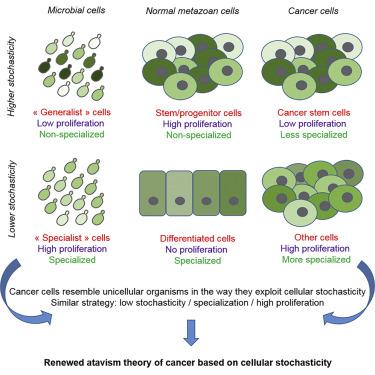iScience ( IF 4.6 ) Pub Date : 2020-09-04 , DOI: 10.1016/j.isci.2020.101531 Jean-Pascal Capp 1 , Frédéric Thomas 2

|
Similarities between microbial and cancer cells were noticed in recent years and serve as a basis for an atavism theory of cancer. Cancer cells would rely on the reactivation of an ancestral “genetic program” that would have been repressed in metazoan cells. Here we argue that cancer cells resemble unicellular organisms mainly in their similar way to exploit cellular stochasticity to produce cell specialization and maximize proliferation. Indeed, the relationship between low stochasticity, specialization, and quiescence found in normal differentiated metazoan cells is lost in cancer. On the contrary, low stochasticity and specialization are associated with high proliferation among cancer cells, as it is observed for the “specialist” cells in microbial populations that fully exploit nutritional resources to maximize proliferation. Thus, we propose a model where the appearance of cancer phenotypes can be solely due to an adaptation and a speciation process based on initial increase in cellular stochasticity.
中文翻译:

微生物和癌细胞群中依赖于细胞随机性的类似物种形成过程
近年来,人们注意到微生物和癌细胞之间的相似性,并作为癌症返祖理论的基础。癌细胞将依赖于在后生动物细胞中被抑制的祖先“遗传程序”的重新激活。在这里,我们认为癌细胞与单细胞生物的相似之处主要在于它们利用细胞随机性来产生细胞特化和最大化增殖的相似方式。事实上,在正常分化的后生动物细胞中发现的低随机性、特化和静止之间的关系在癌症中消失了。相反,低随机性和专门化与癌细胞的高增殖相关,正如观察到微生物群体中的“特殊”细胞充分利用营养资源以最大限度地增殖一样。因此,我们提出了一个模型,其中癌症表型的出现可以完全归因于基于细胞随机性初始增加的适应和物种形成过程。











































 京公网安备 11010802027423号
京公网安备 11010802027423号